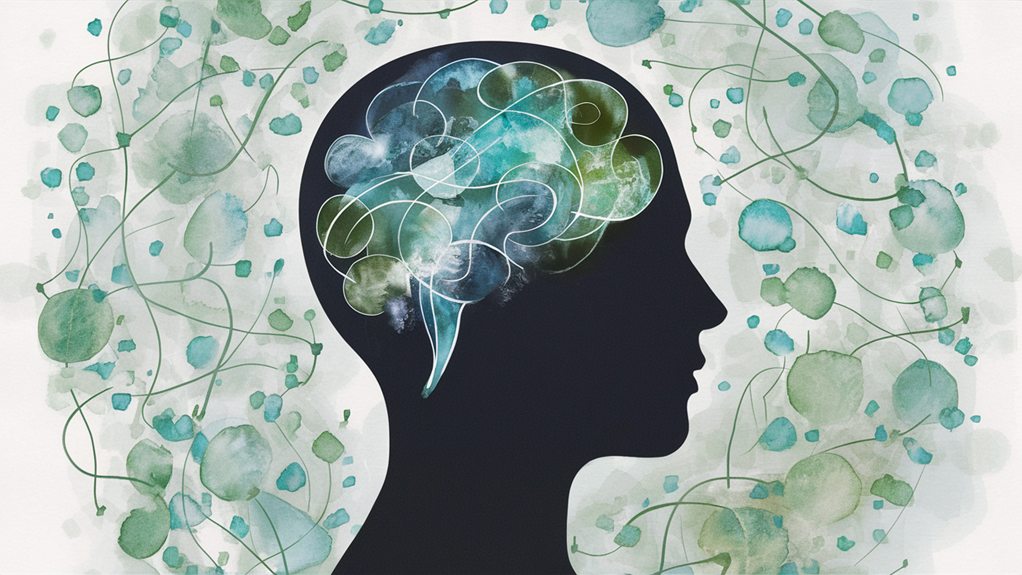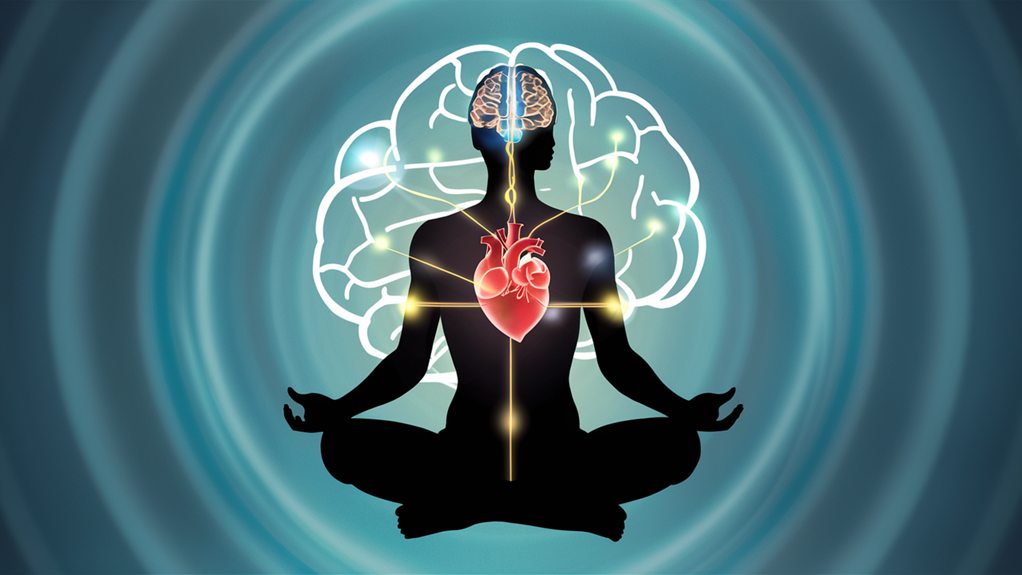Your mental health is the cornerstone of how you think, feel, and handle life's ups and downs. It's your emotional, psychological, and social well-being all wrapped into one, affecting everything from your daily choices to how you connect with others. When you're mentally healthy, you'll find it easier to cope with stress, build meaningful relationships, and work toward your goals. Mental health exists on a spectrum, and everyone's experience is unique and valid. Just like physical health, you can strengthen your mental wellness through various strategies and support systems that enhance your overall quality of life.
Understanding Mental Health Basics

Mental health affects every aspect of our lives, from how we think and feel to how we behave and relate to others. When you're learning about mental health definition basics, you'll discover it's much more than just feeling happy or sad. Your mental health includes your emotional well-being, psychological state, and social connections, which all work together to shape how you handle stress, make choices, and interact with the world around you.
Engaging in practices like journaling can enhance your emotional processing and increase your self-awareness, which are essential components of mental health the healing power of journaling.
Understanding mental health means recognizing that it's just as important as your physical health, and they're actually closely connected. As you explore this mental health overview, you'll find that good mental health helps you cope with life's challenges, build strong relationships, and work toward your goals.
It's about maintaining a healthy balance in your life, recognizing your emotions, and knowing when to seek help if you're struggling. You'll experience ups and downs, and that's completely normal. What's important is developing healthy coping strategies and understanding that mental health exists on a spectrum, where everyone's experience is unique and valid.
Signs of Mental Wellness
What Is Mental Health?
Signs of Mental Wellness
Recognizing the signs of good mental health can help you gauge your own well-being and understand what to aim for in your journey. As you learn more about mental health 101, you'll discover that emotional stability isn't about feeling happy all the time, but rather about maintaining a healthy balance in your life.
Understanding the early warning signs of mental health challenges can further enhance your awareness and proactive approach.
When you're mentally healthy, you'll notice several positive indicators in your daily life:
- You're able to bounce back from setbacks and adapt to changes, showing resilience even when things don't go as planned
- You maintain meaningful relationships and feel comfortable expressing your feelings to others
- You can set realistic goals, make decisions with confidence, and follow through with your commitments
The importance of mental health becomes clear when you're functioning well in these areas.
You'll find yourself managing daily tasks effectively, maintaining a sense of purpose, and feeling generally satisfied with life.
Remember, it's perfectly normal to experience ups and downs, but when you're mentally healthy, you'll have the tools to cope with life's challenges while maintaining your emotional equilibrium.
Knowing these signs helps you actively work toward maintaining your mental wellness.
Common Mental Health Challenges

People face many common mental health challenges that can pop up at different stages of life. You might experience anxiety, which can make you feel worried and tense about everyday situations, and this can be influenced by factors such as genetics and trauma.
Or depression, which often brings persistent sadness and a loss of interest in activities you once enjoyed. These conditions are more common than you'd think, affecting millions of people worldwide.
Other challenges you might encounter include eating disorders, which involve unhealthy relationships with food and body image, or attention deficit hyperactivity disorder (ADHD), which can make it hard to focus and control impulses.
You'll also find that stress, while normal in small doses, can become overwhelming and lead to burnout if it's not managed well.
Some people struggle with social anxiety, making it difficult to interact with others or speak in public, while others deal with obsessive-compulsive disorder (OCD), which involves recurring thoughts and repetitive behaviors.
It's important to remember that these challenges don't define you, and there's no shame in seeking help when you're struggling with your mental health.
Maintaining Positive Mental Health
While facing mental health challenges is common, taking proactive steps to support your emotional well-being can make a real difference. You'll find that maintaining positive mental health is similar to caring for your physical health, requiring regular attention and dedication.
By incorporating healthy habits into your daily routine, you're building a strong foundation for emotional resilience and stability. Importantly, nutrition plays a crucial role in your mood and mental health, as certain foods can enhance your emotional well-being and overall mental state the role of nutrition in mental health.
To protect and enhance your mental well-being, you'll want to focus on establishing consistent practices that work for you. Think of these practices as essential tools in your mental health toolkit, ready whenever you need them.
- Start each day with a moment of mindfulness, whether it's deep breathing exercises, meditation, or simply enjoying your morning coffee in peaceful reflection.
- Build strong social connections by reaching out to friends and family regularly, sharing your thoughts and feelings, and offering support to others.
- Create a balanced lifestyle that includes regular physical activity, nutritious meals, and adequate sleep, as these factors directly impact your emotional state.
The Body-Mind Connection

Through decades of research, scientists have confirmed that your physical and mental health are deeply intertwined, working together like two sides of the same coin. When you're feeling anxious or stressed, your body responds with physical symptoms like a racing heart, sweaty palms, or stomach discomfort.
Similarly, when you're not feeling well physically, it can affect your mood and mental well-being. Evidence suggests that the link between diet and mental health plays a significant role in this connection, as certain foods can influence mood and cognitive function.
You'll notice this connection in your daily life, as regular exercise can boost your mood by releasing feel-good chemicals called endorphins, while chronic pain can lead to depression. Your sleep patterns, diet, and physical activity levels all play vital roles in maintaining both your physical and mental health.
For example, when you're well-rested, you're better equipped to handle stress and emotional challenges. Understanding this connection can help you make better choices for your overall well-being.
Simple activities like taking a walk when you're feeling down, practicing deep breathing when you're stressed, or maintaining a consistent sleep schedule can positively impact both your body and mind.
Social Impact on Mental Health
Social connections form the cornerstone of human mental health, with meaningful relationships acting as powerful buffers against stress, anxiety, and depression. Your social environment, including family, friends, and community, directly influences how you think, feel, and cope with life's challenges.
When you're surrounded by supportive people, you'll find it easier to maintain emotional balance and overcome obstacles. Engaging in healthy coping mechanisms and practicing self-compassion can further enhance these connections and bolster your resilience.
Your mental well-being is closely tied to your social interactions, and research shows that strong social networks can:
- Reduce your risk of developing mental health conditions by providing emotional support and practical help when you need it most
- Boost your self-esteem and confidence through positive feedback and acceptance from others
- Help you develop better coping mechanisms by learning from others' experiences and sharing your own
You'll notice that the quality of your relationships matters more than the quantity. Even a few close, trusted connections can considerably impact your mental health.
When you invest time in nurturing these relationships, you're actually investing in your own psychological wellness. Remember, it's not just about having people around you—it's about building meaningful connections that contribute to your emotional resilience.
Treatment and Support Options

Getting help for mental health concerns has become more accessible than ever, with numerous evidence-based treatments and support systems available.
You'll find that professional therapists and counselors can offer various approaches, including cognitive behavioral therapy, talk therapy, and group sessions, to help you manage your mental health challenges.
When you're ready to seek support, you'll discover multiple options that fit your needs and comfort level. Your primary care doctor can refer you to mental health specialists, or you can connect with therapists through online platforms and telehealth services.
Many communities also offer support groups, where you can share experiences with others facing similar challenges.
Treatment isn't limited to traditional therapy, as you might benefit from a combination of approaches. Medication prescribed by psychiatrists can help balance brain chemistry, while wellness activities like meditation, exercise, and stress management techniques can complement your treatment plan.
You'll also find that many schools and workplaces now offer counseling services and mental health resources, making it easier to access support when and where you need it.
Building Mental Health Resilience
While facing life's challenges can feel overwhelming, developing mental health resilience helps you bounce back from setbacks and adapt to change more effectively. You can strengthen your resilience through daily practices, supportive relationships, and a positive mindset.
Think of resilience as a muscle that gets stronger with regular exercise and proper care.
To build your mental health resilience, you'll want to focus on developing healthy coping strategies that work for you. Start by creating routines that support your emotional well-being, and don't hesitate to adjust them as needed. You can also learn from past experiences, using them as stepping stones rather than stumbling blocks.
Here are key strategies to boost your mental health resilience:
- Practice self-care consistently, including regular exercise, healthy eating, and adequate sleep
- Build and maintain strong connections with family, friends, and your community
- Develop problem-solving skills through journaling, meditation, or talking with trusted mentors



